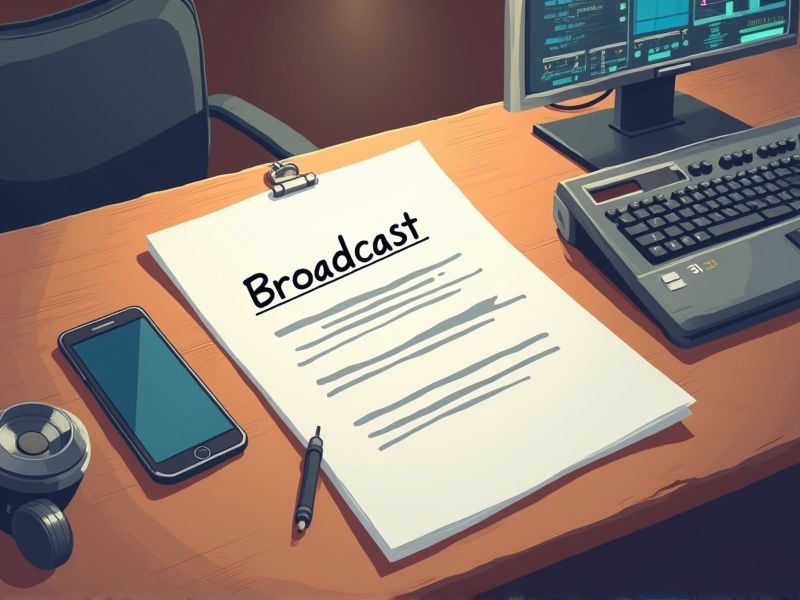
Broadcast technicians play a crucial role in maintaining and operating equipment for television and radio broadcasts, ensuring seamless transmission. Certifications validate their expertise and familiarity with evolving technology, enhancing their job performance and reliability. As technology advances, certifications help technicians stay updated with the latest tools and industry standards. Here are some important certifications that are essential for a Broadcast technician.
SBE Certified Broadcast Technologist (CBT)
The SBE Certified Broadcast Technologist (CBT) credential validates a broadcast technician's technical skills and knowledge, promoting trust in their professional capabilities. Certification provides a competitive edge in the job market by highlighting an individual's up-to-date proficiency with current industry standards. The CBT assures employers of the technician's commitment to ongoing learning and professional development. Holding the certification can lead to career advancement opportunities and potentially higher salary prospects.
SBE Certified Broadcast Networking Technologist (CBNT)
The SBE Certified Broadcast Networking Technologist (CBNT) certification provides broadcast technicians with validation of their networking skills, essential for modern broadcast operations. As broadcast technology increasingly relies on IT and networking, having the CBNT certification demonstrates a technician's ability to manage these systems effectively. The certification enhances credibility within the industry, making technicians more competitive in the job market. Many employers prefer or require CBNT certification to ensure their team is equipped with the latest knowledge in broadcast networking.
FCC General Radio Telephone Operator License (GROL)
The FCC General Radio Telephone Operator License (GROL) is necessary for broadcast technicians because it authorizes them to repair, maintain, and operate radio transmitters, which are integral to broadcast facilities. Without the GROL, broadcast technicians cannot legally handle the necessary equipment, limiting their ability to perform critical job functions. The license ensures that technicians have verified knowledge and skills, which helps maintain reliable and interference-free broadcasting operations. Having a GROL enhances a technician's professional credibility, increasing employment opportunities in the telecommunications sector.
FCC Broadcast Radio Operator License
The FCC Broadcast Radio Operator License is required because it ensures that broadcast technicians are knowledgeable about relevant regulations and technical requirements. This licensure validates a technician's ability to operate and maintain broadcasting equipment according to federal standards. Compliance with these regulations is necessary to prevent frequency interference and to maintain broadcast integrity. Licensure helps maintain standardized practices and contributes to the overall safety and efficiency of broadcast operations.
CompTIA A+ Certification
The CompTIA A+ certification equips broadcast technicians with essential IT skills, ensuring smooth operation and troubleshooting of digital broadcast equipment. Broadcast technology increasingly integrates advanced computer systems, necessitating a foundational understanding of hardware and software. This certification validates a technician's capability to manage and address technical disruptions effectively within a broadcast environment. Employers often prefer candidates with this credential, as it reflects a professional standard in IT knowledge related to broadcasting.
CompTIA Network+ Certification
The CompTIA Network+ Certification provides broadcast technicians with foundational networking skills, essential for managing complex networked broadcast equipment. Technical proficiency in network configuration and troubleshooting ensures minimal disruption during live broadcasts. Understanding network security through this certification helps protect sensitive broadcast data from cyber threats. Employers often recognize this certification as evidence of a technician's ability to handle advanced technological systems efficiently.
Cisco Certified Network Associate (CCNA)
Broadcast technicians must manage and troubleshoot network systems to ensure seamless communication between various equipment. The CCNA certification equips them with fundamental networking skills, enabling better management of IP-based broadcast technologies. With increasing digitalization, broadcast systems heavily rely on networking, making this certification crucial for efficient operations. Possessing a CCNA improves a technician's ability to address technical issues quickly, leading to reduced downtime during broadcasts.
Adobe Certified Expert (ACE) - Premiere Pro
A broadcast technician needs the Adobe Certified Expert (ACE) - Premiere Pro certification to demonstrate proficiency in video editing software used extensively in the industry. The certification validates a technician's skills, ensuring they can effectively handle complex editing tasks and meet professional standards. Mastery of Premiere Pro facilitates efficient workflow management and boosts production quality. The certification provides a competitive edge in the job market, signaling expertise to employers seeking skilled professionals.
Apple Certified Pro - Final Cut Pro X
Earning the Apple Certified Pro - Final Cut Pro X certification demonstrates a broadcast technician's proficiency in using one of the industry's leading video editing software, increasing job opportunities. Employers often prefer certified professionals as it indicates a foundational understanding and skillset aligned with industry standards. This certification aids in efficient workflow management, crucial for meeting tight broadcast schedules. It also equips broadcast technicians with the latest tools and techniques necessary for high-quality video production.
Avid Media Composer Certification
Broadcast technicians often need Avid Media Composer Certification because it ensures proficiency in one of the industry's leading post-production software. This certification enhances their ability to efficiently edit and manage complex video projects, leading to increased job opportunities and career advancement. Employers often prefer certified professionals, as it assures they have a standardized and comprehensive understanding of the software's tools and capabilities. Consequently, certification often results in improved workflow and reduced project errors, which are critical in the fast-paced broadcasting environment.
Summary
When you obtain certifications as a broadcast technician, your credibility and employability tend to increase significantly. The certifications validate your skills, making you more competitive in the job market. Consequently, employers may offer higher salaries and more advanced positions due to your verified expertise. Over time, as you accumulate more certifications, career growth opportunities expand due to the diverse tasks you can effectively manage.
